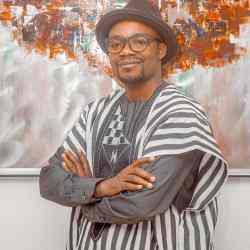Introduction
In the mid 1980s Yvonnick Huet pioneered a market-based model to solve poverty and food issues through the restructuring of viable local farming markets in developing countries. Unlike the field of development that has traditionally been charity-focused and culturally skeptical toward economy-oriented projects, Yvonnick has focused his efforts on small businesses as the key facilitator in development. He has become the architect of a new field that promotes access to markets and full economic citizenship.
The New Idea
In response to the lack of sufficient attention to economic dimensions in programs facilitated by traditional development organizations, in particular in French-speaking Africa, Yvonnick became one of the first to promote market-driven solutions to develop poor people’s economies. In addition to market-driven solutions, Yvonnick focuses on restoring these communities’ roles in society while also shifting the mindset of individuals so that they engage as active participants in the market. For seven years in Congo, beginning in 1984, he diverged from the traditional development practitioner approach to begin designing and piloting an unprecedented model to build local independent farming markets. Yvonnick pioneered a multidimensional approach, beginning with business creation and development in addition to farming techniques and the emergence of new institutions. At the heart of his idea is his vision to harness the potential of informal and poor workers in the surroundings of major cities. Yvonnick wants to build strong networks of micro business-minded farming entrepreneurs capable of accessing the market and competing with big agro-industrial players and imports. Supported by the state and private companies, he has successfully shaped the market, reversing the 85 percent rate of imported goods of Brazzaville’s food market into 85 percent locally-produced fruits and vegetables.
After ten years of on-the-ground experience, Yvonnick then scaled his work to other contexts that were also in need of market responses to economic crises. Throughout the 1990s he systematized his approach to build “green belts” in the surroundings of major cities in French-speaking Africa and Asia. Working hand-in-hand with grassroots organizations, ministers, and development agencies at both national and international levels, he facilitated a shift in mindset toward the support of small business. Empowering local stakeholders and encouraging the creation of national institutions on micro-entrepreneurship and agro-ecology, Yvonnick has built solid ecosystems that can ensure the sustainability and growth of his model. Now running programs in 13 countries in four continents, he has directly supported the creation of 27,500 small businesses with a great survival rate, generating 100,000 sustainable jobs and helping 250,000 people to escape poverty. Through Yvonnick’s network of “master-farmers” and trained organizations that disseminate his model, he estimates that he generates a multiplier effect ratio of 12.
The Problem
In the 1980s Congo’s economic and agricultural system was mostly planned by the state, and divided into big state farms, national development projects funded by international agencies, offshore companies, and a large informal economy by local population. As in many other developing countries often struck by food crises since the 1980s, little space is given to small-business entrepreneurship, resulting in the lack of a structured and durable food production system as well as economy-driven solutions to overcome poverty. In addition, these local economies rely on big industries whose exported goods are not even produced with the intent to feed local populations. Under this system, there are significant barriers to the creation of small businesses and limited tools available for local populations to overcome them. Particularly twenty years ago, when Yvonnick began working on developing his model, the solutions to poverty reduction offered by development assistance agencies were often too partial and too short-term to address the root causes of the problem. Fragmented into farming techniques, business support, social assistance, and financial aid, they were not extensive and collaborative enough to help people through the complex path of becoming full economic citizens. In addition, the development projects of citizen organizations (COs) were completed according to the international donor’s agenda, instead of according to local needs. At the time, no budget lines were dedicated to small entrepreneurship support. Most of the funded programs were focused on free education, health, and food. Due to their short-term approach, they limit the resilience of development assistance and fail to address the projects’ courses after the COs leave. Local populations become dependent on the assistance of the COs. Finally, CO solutions are often offered from the North to the South, are not in touch with the field, and lack consultation and local involvement.
Recognizing the limitation of their networks and on-the-ground expertise, international donors and private companies are more willing than ever to invest in long-term solutions and propose an integrated approach. As the French Agency of Development (AFD) explained, financial institutions are very demanding of approaches such as Agrisud’s. To solve the accelerating challenges of poverty and the food crisis, as well as specific issues of disadvantaged groups such as women or young people, it is critical that there is an increase in the number of actors who work to rebuild the microeconomic fabric and thus foster long-term economic development.
The Strategy
In 1984 Yvonnick saw the creation and development of a large number of micro businesses as a key strategy to foster new farming markets and restore the autonomy of poor populations. He initially used the support of the Congolese state (getting a percentage of oil revenues) and major private companies like Total to launch his programs. Now, Yvonnick’s integrated approach is based on a three-step process to reorganize the farming structure: (i) conduct an in-depth market analysis to understand local macro and microeconomic specificities and design the proper path of intervention (ii) design a grassroots action plan to identify local partners and potential beneficiaries (iii) train beneficiaries to build business capacity and to improve techniques among small farming businesses. Underlying these efforts, Yvonnick also works to ensure that individuals consider themselves as central to the supply chain. Agrisud follows their progress over three years. During this time, Agrisud provides them with the right tools to understand and propose an appropriate offer to the market, constantly watching its evolution through economic research institutes. Agrisud has also worked on expanding the network’s markets by building bridges with private companies such as Veolia for water distribution or Club Med for food supply in tourism hotels. By facilitating those win-win alliances, Yvonnick is opening new markets from which small producers were previously excluded, while advising private groups to shift their practices and develop economic relationships with local populations.
Yvonnick recognizes the great potential of his problem solving model within contexts beset with natural catastrophes, political instability, and food crises. Since 1993, Yvonnick has been applying his approach to many countries in Africa, Asia, and Latin America. Determined to avoid reliance on Agrisud, he has encouraged the emergence of powerful local networks to support small businesses in their development. Yvonnick emphasizes the creation of national structures affiliated with Agrisud to ensure the sustainability of the model. When a gap exists in the local institutional setting, Agrisud fills this gap through initiating new activities to fill it. In Gabon for instance, the Gabonese Institute of Development, a national non-profit entity to foster the agro-ecology field across the country, was created by Agrisud (1992) and has been playing a key role in structuring the local farming markets ever since. In addition, by constantly increasing the number of business-minded farmers, Yvonnick’s ground approach lies in building the capacity of “master-farmers”—trained and experienced farmers supported by Agrisud—to disseminate the know-how in local area networks. This strategy is proving a tremendous impact: In the Democratic Republic of Congo, 2,000 farmers were supported directly by Agrisud, but through the network effect of master-farmers, 25,000 farmers have been effectively trained. With master-farmers in thirteen countries, there is great potential for this self-fuelled process.
Responding to a high demand, Yvonnick has created tools to formalize and deploy the way Agrisud impacts markets. His expertise is so recognized today that he is routinely consulted by local actors and international donors. This proactive approach allows Agrisud to apply its own project without the interfering agenda of international donors. It also accrues roughly €5 million (US$6.5 million) in funding each year from local ministries as well as French and European development agencies to launch and sustain programs. To impact markets on a permanent basis, Yvonnick is building strategic alliances with key partners in new countries and new sectors: CIRAD for horticulture, French Senior Fellow Pierre Rabhi’s Terre et Humanisme for agroecology, and AFD for French development assistance. Yvonnick’s methodological approach has enabled him to scale widely in various contexts. Constantly acting on new opportunities, he is currently launching a project in France with the Food Bank to support unemployed women in creating small businesses around wasted fruits and vegetable recycling. Finally, to further multiply Agrisud’s impact beyond its own development capacity, Yvonnick has developed two Learning Cycles to train COs and institutions in order to spread his tools. The ninety COs trained so far are transforming their practices while reaching new in-need populations and integrating a systemic economic approach to respond to developing countries challenges.
Yvonnick recognizes that to reduce poverty and increase food security, individuals and communities need functioning, local markets and that to help create and sustain these local markets it is critical to shift the mindset of individuals so that they view themselves as active and engaged participants in a supply-chain for the market. He recognized that a key part of this was changing the relationship between the individual farmers and the other actors in the local markets. Yvonnick brings together groups of individuals to overcome barriers to entering the market (e.g. transportation costs, the need to have a certain amount or volume of food, and physical space constraints in the actual marketplace where goods are sold); and then he works to create an enabling environment for the farmers to succeed and last over time. Activities that help him achieve this include, training in negotiating skills, training local organizations to provide business advice, and enlisting local institutions to provide small amounts of credit to the collective.
Yvonnick has become a reference and architect of the field. He can now share broadly his expertise and know-how through apprenticeship cycles. Yvonnick keeps innovating to apply his model to various contexts to help people reduce hardship by becoming successful micro entrepreneurs. In Cambodia, Niger, Haiti, Angola, or Sri Lanka, in contexts of social and humanitarian crisis, thousands of refugees have crafted a social and economic role in society by launching their own small businesses. More recently, Yvonnick has begun to apply his approach in France by supporting long-term unemployed women who need an integrated and entrepreneurial solution to improve their condition.
The Person
Yvonnick spent his childhood in Brittany where his mother planted the seed for the idea of going to Africa. He studied agronomy and eventually left as a volunteer at 22. For seven years he worked as an agronomist in the humanitarian field with an international volunteer organization, in charge of creating a regional tree-nursery in Niger or setting up food security programs in Sao Tomé. In 1985, when he was about to take a position with the EU, he had a key encounter with the economist Jacques Baratier in Niger, who shared with him the same insight: Humanitarian development requires an economic dimension in its solutions. They both decided to commit to creating Agricongo, which implied no salary and also taking his wife and newborn daughter with him to Africa. Yvonnick’s co-founder passed away, but Yvonnick continued to lead and be the visionary for the organization’s work.
Yvonnick capitalized on every failure and success of the Agricongo project to improve his approach step by step. An ambitious and structured personality, he wanted to develop the project and thus imagined a new organization able to bear the development of his model. In 1992 he created Agrisud, the international manifestation of Agricongo, and launched in Gabon and Cambodia. Meanwhile, Yvonnick stayed in the Congo with his wife and two daughters, also managing the national project and international development. He stayed even during the civil war, to eventually return to France in 1995 to coordinate the Agrisud network from there. Yvonnick’s vision of international development has allowed Agrisud International to increase its presence four-fold in new countries in ten years. Aware of the challenges presented by such an extended network, he has redeveloped his team to be more efficient, while always attentive as a manager to inform and work with every local team to understand the importance of Agrisud.
Positioning Agrisud as a master-farmer transferring its know-how, Yvonnick intervenes as an expert to the PNUD and the EU. Interested to share its experience, he also gives lectures on sustainable development in schools and universities in France. In 2009 Yvonnick co-founded with Be-linked the Business and Poverty Association at HEC Business School. Always assessing solutions and formalizing tools, he is now working on an extended social measurement based on a pilot SROI study realized in partnership with Planète d’Entrepreneurs. He remains modest, in spite of being made Chevalier of the Legion of Honor, and enjoys his life in West of France with his wife and daughters. Still impassioned with Africa and by the field, Yvonnick continues to travel there and to other continents to launch new projects, create new partnerships, and invent new models for development, while preserving his core vision of full economic citizenship for people around the world.




